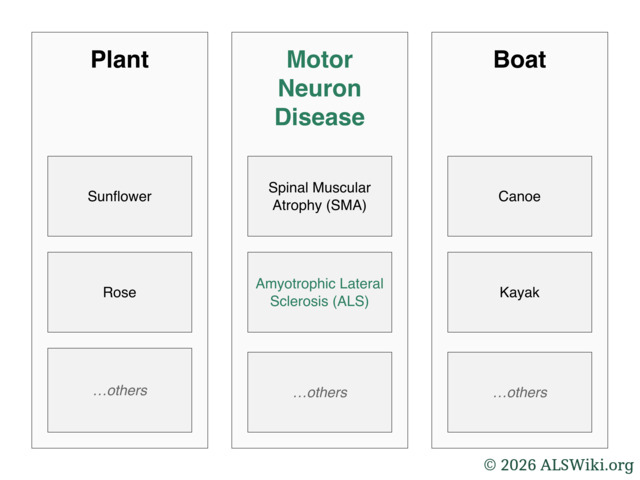¶ Names Used in English
ALS stands for Amyotrophic Lateral Sclerosis. ALS is sometimes called Lou Gehrig's Disease, or Motor Neuron Disease. The prevalence of these terms varies regionally.
| Name | Abbreviation | Places Used |
|---|---|---|
| Amyotrophic Lateral Sclerosis | ALS |
Canada |
| Lou Gehrig's Disease | LGD (rarely) | United States |
| Motor Neuron Disease | MND |
Australia |
The use of multiple distinct names for the same disease makes it more difficult to locate resources on the Internet and in medical publications. Users of social media platforms, such as X (Twitter) often use multiple hashtags to cast a wider net when writing posts about ALS or MND.
¶ Amyotrophic Lateral Sclerosis
Amyotrophic lateral sclerosis, strictly speaking, is a type of motor neuron disease. Being one of the most common and well-known forms of motor neuron disease, the term is often used in place of motor neuron disease itself.
Amyotrophic is a term of Greek origin, meaning “no muscle nourishment”.
Lateral refers to the area of the spinal cord where the affected motor neurons are located.
Sclerosis is a term referring to the process of hardening or scarring.
| "Amyotrophic" | |
|---|---|
| Component | Meaning |
| a | negation; “not” |
| myo | muscle |
| troph | food, nourishment |
| -ic | of, or relating to |
The abbreviation ALS is also used in many other contexts. Below are some that are relatively common:
- Advanced Life Support: Medical protocols for managing severe trauma, cardiac arrest, or other life-threatening emergencies.
- Accelerated Learning System: Educational programs designed for faster learning.
¶ Lou Gehrig's Disease
Lou Gehrig was a famous American baseball player that was diagnosed with ALS in his mid 30s. Initially, his athletic performance began to gradually decline, before eventually forcing him to retire. Public awareness of the disease increased significantly as a result; many charities and foundations are named after him.
¶ Motor Neuron Disease
Motor Neuron Disease is a literal term to describe the disease. ALS is a disease of the motor neurons.
Side Note: Spelling of "Neuron"
The word neuron is spelled two different ways: with and without the trailing “e”. American and Canadian English typically omit the “e”, while other English-speaking countries such as the United Kingdom, Australia, and New Zealand retain the “e”. Countries that use the term Motor Neurone Disease to describe ALS typically include the same “e” at the end.
The English version of ALSWiki.org is written in American English; the spelling for the word neuron always omits the trailing “e”, unless it is part of a proper noun, such as in the name of an MND organization.
¶ Names Used in Other Languages
Most languages use an equivalent translation of either Amyotrophic Lateral Sclerosis, or Motor Neuron Disease.
| Table: Names for ALS in languages other than English | ||
|---|---|---|
| Language | Name | Abbreviation |
| Arabic | التصلب الجانبي الضموري (altasalub aljanibiu aldumuriu) |
??? |
| Chinese |
肌萎缩性脊髓侧索硬化症 (Jī wěisuō xìng jǐsuǐ cè suǒ yìnghuà zhèng) |
??? |
| Dutch | Amyotrofe laterale sclerose | ALS |
| French | Sclérose latérale amyotrophique | SLA |
| German | Amyotrophe Lateralsklerose | ALS |
| Italian | Sclerosi laterale amiotrofica | SLA |
| Japanese | 筋萎縮性側索硬化症 (Kin'ishukuseisokusakukōkashō) |
??? |
| Persian | اسکلروز جانبی آمیوتروفیک | ??? |
| Polish | Stwardnienie zanikowe boczne | ALS* |
| Portuguese | Esclerose lateral amiotrófica | ELA |
| Russian |
Боковой амиотрофический склероз (Bokovoj amiotroficheskij skleroz) |
БАС |
| Spanish | Esclerosis lateral amiotrófica | ELA |
| Swedish | Amyotrofisk lateralskleros | ALS |
| Turkish | Amyotrofik Lateral Skleroz | ALS |
| Ukrainian |
Бічний аміотрофічний склероз (Bichnyj amiotrofichnyj skleroz) |
БАС |
*: Some languages use the letters “ALS” as an abbreviation for the disease, despite the translation for Amyotrophic Lateral Sclerosis using terms that start with different letters.
